Facebook: the big questions
Cat Lee talks Translations, the future of the site and how Facebook will be everywhere
Sign up for breaking news, reviews, opinion, top tech deals, and more.
You are now subscribed
Your newsletter sign-up was successful
TR: How long did it take to come up with the app?
CL: It took several months and then we released it to application partners on Facebook to translate their applications. To expand this application on the web took two months.
What is interesting about the technology is that It was actually built by an intern working at Facebook.
TR: Who has started using it?
CL: Playfish is one app which has translated all its games using this framework. There are football applications that were English which are now in Spanish because of this app. What this means is they did have an app for the Premiership but now they can add things like La Liga.
Tourism is also a massive factor for this app as well. For example the Rio tourism board is using it to translate its website for overseas visitors to many different languages.
What's useful to know is that when the site is translated, developers own the intellectual property.
Sign up for breaking news, reviews, opinion, top tech deals, and more.
We are just a mediator. We provide them with the technology and it is free. We hope that it is going to help with sharing and connecting people, which is what we want to do with the technology. Saying that, developers can do what they want with it.

TR: So, if I went on to a translated website, would it have any Facebook branding?
CL: If your locale on Facebook is, say, Spain, then you go on to the website which has been translated will prompt you to log onto Facebook Connect, you will see the website in Spanish.
The website would be completely normal, there's no Facebook branding.
It's all based round FBML – a super-set of HTML. It is basically run through the browser, so your browser will tell where your locale is and render the text.
TR: What's the feedback been with Facebook Connect?
CL: Since we made Facebook Connect readily available in December [2008] we have seen over 15,000 websites and applications.
This is not only on the web; we have seen many examples on mobile devices, on the mobile web and the iPhone. We have also seen it on games consoles – on the Xbox and the Nintendo DSi.
We are quite busy with all the partners coming to us with questions, so we are thrilled to see it expand and grow.
This is primarily because the benefits to many of these businesses are traffic, engagement, and registrations. They can have this on-going relationship with users.
This is because we make it very easy for users of Facebook Connect to publish back into Facebook and for many of these websites, they see a big success with the click-backs of stories.
And companies like greeting card website JibJab.com have seen 20 click-backs per story. That's in comparison to them marketing to users through emails, where they received around three click-backs so they are seeing a seven-times increase.

The other thing is that we give access to the core elements of Facebook. So when you have Facebook Connect and you sign into their site they already know things about that customer's identity: who they are, their hobbies, their birthday. You can make and personalise the site for them and create a more engaging experience for them.
We also give them access to their connections. Most users believe that things are better experienced with friends. A lot of businesses try and build there own sociograph. It is very hard to establish that, and we want to make sure that entrepreneurs who are just getting started can access our sociograph, which doesn't just include friends but the brands they are associated with and all of that.
Current page: Connecting people
Prev Page Translations translated Next Page Facebook Connect in action
Marc Chacksfield is the Editor In Chief, Shortlist.com at DC Thomson. He started out life as a movie writer for numerous (now defunct) magazines and soon found himself online - editing a gaggle of gadget sites, including TechRadar, Digital Camera World and Tom's Guide UK. At Shortlist you'll find him mostly writing about movies and tech, so no change there then.